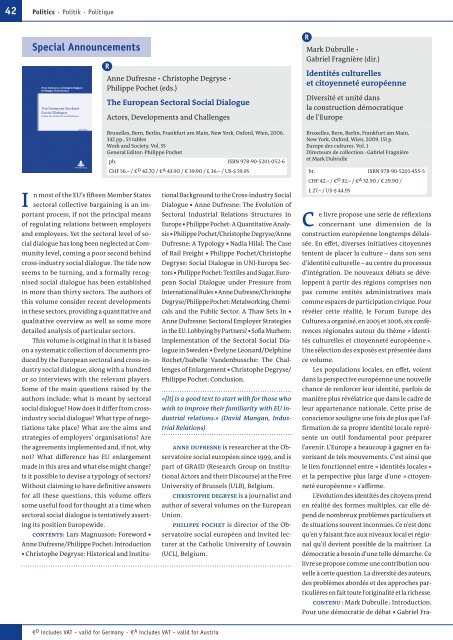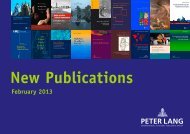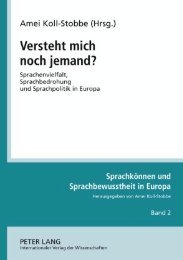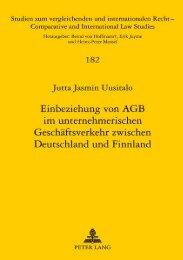Erfolgreiche ePaper selbst erstellen
Machen Sie aus Ihren PDF Publikationen ein blätterbares Flipbook mit unserer einzigartigen Google optimierten e-Paper Software.
42 Politics · Politik · Politique<br />
I<br />
Special Announcements<br />
n most of the EU’s fifteen Member States<br />
sectoral collective bargaining is an important<br />
process, if not the principal means<br />
of regulating relations between employers<br />
and employees . Yet the sectoral level of social<br />
dialogue has long been neglected at Community<br />
level, coming a poor second behind<br />
cross-industry social dialogue . The tide now<br />
seems to be turning, and a formally recognised<br />
social dialogue has been established<br />
in more than thirty sectors . The authors of<br />
this volume consider recent developments<br />
in these sectors, providing a quantitative and<br />
qualitative overview as well as some more<br />
detailed analysis of particular sectors .<br />
This volume is original in that it is based<br />
on a systematic collection of documents produced<br />
by the European sectoral and cross-industry<br />
social dialogue, along with a hundred<br />
or so interviews with the relevant players .<br />
Some of the main questions raised by the<br />
authors include: what is meant by sectoral<br />
social dialogue? How does it differ from crossindustry<br />
social dialogue? What type of negotiations<br />
take place? What are the aims and<br />
strategies of employers’ organisations? Are<br />
the agreements implemented and, if not, why<br />
not? What difference has EU enlargement<br />
made in this area and what else might change?<br />
Is it possible to devise a typology of sectors?<br />
Without claiming to have definitive answers<br />
for all these questions, this volume offers<br />
some useful food for thought at a time when<br />
sectoral social dialogue is tentatively asserting<br />
its position Europewide .<br />
Contents: Lars Magnusson: Foreword •<br />
Anne Dufresne/Philippe Pochet: Introduction<br />
• Christophe Degryse: Historical and Institu-<br />
Anne Dufresne • Christophe Degryse •<br />
Philippe Pochet (eds .)<br />
The European Sectoral Social Dialogue<br />
Actors, Developments and Challenges<br />
Bruxelles, Bern, Berlin, Frankfurt am Main, New York, Oxford, Wien, 2006 .<br />
342 pp ., 53 tables<br />
Work and Society . Vol . 55<br />
General Editor: Philippe Pochet<br />
pb . ISBN 978-90-5201-052-6<br />
CHF 56 .– / € D 42 .70 / € A 43 .90 / € 39 .90 / £ 36 .– / US-$ 59 .95<br />
€ D includes VAT – valid for Germany · € A includes VAT – valid for Austria<br />
tional Background to the Cross-industry Social<br />
Dialogue • Anne Dufresne: The Evolution of<br />
Sectoral Industrial Relations Structures in<br />
Europe • Philippe Pochet: A Quantitative Analy-<br />
sis • Philippe Pochet/Christophe Degryse/Anne<br />
Dufresne: A Typology • Nadia Hilal: The Case<br />
of Rail Freight • Philippe Pochet/Christophe<br />
Degryse: Social Dialogue in UNI-Europa Sec-<br />
tors • Philippe Pochet: Textiles and Sugar . Euro-<br />
pean Social Dialogue under Pressure from<br />
International Rules • Anne Dufresne/Christophe<br />
Degryse/Philippe Pochet: Metalworking, Chemi-<br />
cals and the Public Sector . A Thaw Sets In •<br />
Anne Dufresne: Sectoral Employer Strategies<br />
in the EU . Lobbying by Partners? • Sofia Murhem:<br />
Implementation of the Sectoral Social Dia-<br />
logue in Sweden • Évelyne Léonard/Delphine<br />
Rochet/Isabelle Vandenbussche: The Chal-<br />
lenges of Enlargement • Christophe Degryse/<br />
Philippe Pochet: Conclusion .<br />
«[It] is a good text to start with for those who<br />
wish to improve their familiarity with EU industrial<br />
relations.» (David Mangan, Industrial<br />
Relations)<br />
anne duFresne is researcher at the Observatoire<br />
social européen since 1999, and is<br />
part of GRAID (Research Group on Institutional<br />
Actors and their Discourse) at the Free<br />
University of Brussels (ULB), Belgium .<br />
ChristoPhe degrYse is a journalist and<br />
author of several volumes on the European<br />
Union .<br />
PhiliPPe PoChet is director of the Observatoire<br />
social européen and invited lecturer<br />
at the Catholic University of Louvain<br />
(UCL), Belgium .<br />
Mark Dubrulle •<br />
Gabriel Fragnière (dir .)<br />
Identités culturelles<br />
et citoyenneté européenne<br />
Diversité et unité dans<br />
la construction démocratique<br />
de l’Europe<br />
Bruxelles, Bern, Berlin, Frankfurt am Main,<br />
New York, Oxford, Wien, 2009 . 151 p .<br />
Europe des cultures . Vol . 1<br />
Directeurs de collection : Gabriel Fragnière<br />
et Mark Dubrulle<br />
C<br />
br . ISBN 978-90-5201-455-5<br />
CHF 42 .– / € D 32 .– / € A 32 .90 / € 29 .90 /<br />
£ 27 .– / US-$ 44 .95<br />
e livre propose une série de réflexions<br />
concernant une dimension de la<br />
construction européenne longtemps délaissée<br />
. En effet, diverses initiatives citoyennes<br />
tentent de placer la culture – dans son sens<br />
d’identité culturelle – au centre du processus<br />
d’intégration . De nouveaux débats se développent<br />
à partir des régions comprises non<br />
pas comme entités administratives mais<br />
comme espaces de participation civique . Pour<br />
révéler cette réalité, le Forum Europe des<br />
Cultures a organisé, en 2005 et 2006, six conférences<br />
régionales autour du thème « Identités<br />
culturelles et citoyenneté européenne » .<br />
Une sélection des exposés est présentée dans<br />
ce volume .<br />
Les populations locales, en effet, voient<br />
dans la perspective européenne une nouvelle<br />
chance de renforcer leur identité, parfois de<br />
manière plus révélatrice que dans le cadre de<br />
leur appartenance nationale . Cette prise de<br />
conscience souligne une fois de plus que l’affirmation<br />
de sa propre identité locale représente<br />
un outil fondamental pour préparer<br />
l’avenir . L’Europe a beaucoup à gagner en favorisant<br />
de tels mouvements . C’est ainsi que<br />
le lien fonctionnel entre « identités locales »<br />
et la perspective plus large d’une « citoyenneté<br />
européenne » s’affirme .<br />
L’évolution des identités des citoyens prend<br />
en réalité des formes multiples, car elle dépend<br />
de nombreux problèmes particuliers et<br />
de situations souvent inconnues . Ce n’est donc<br />
qu’en y faisant face aux niveaux local et régional<br />
qu’il devient possible de la maîtriser . La<br />
démocratie a besoin d’une telle démarche . Ce<br />
livre se propose comme une contribution nouvelle<br />
à cette question . La diversité des auteurs,<br />
des problèmes abordés et des approches particulières<br />
en fait toute l’originalité et la richesse .<br />
Contenu : Mark Dubrulle : Introduction .<br />
Pour une démocratie de débat • Gabriel Fra-

















